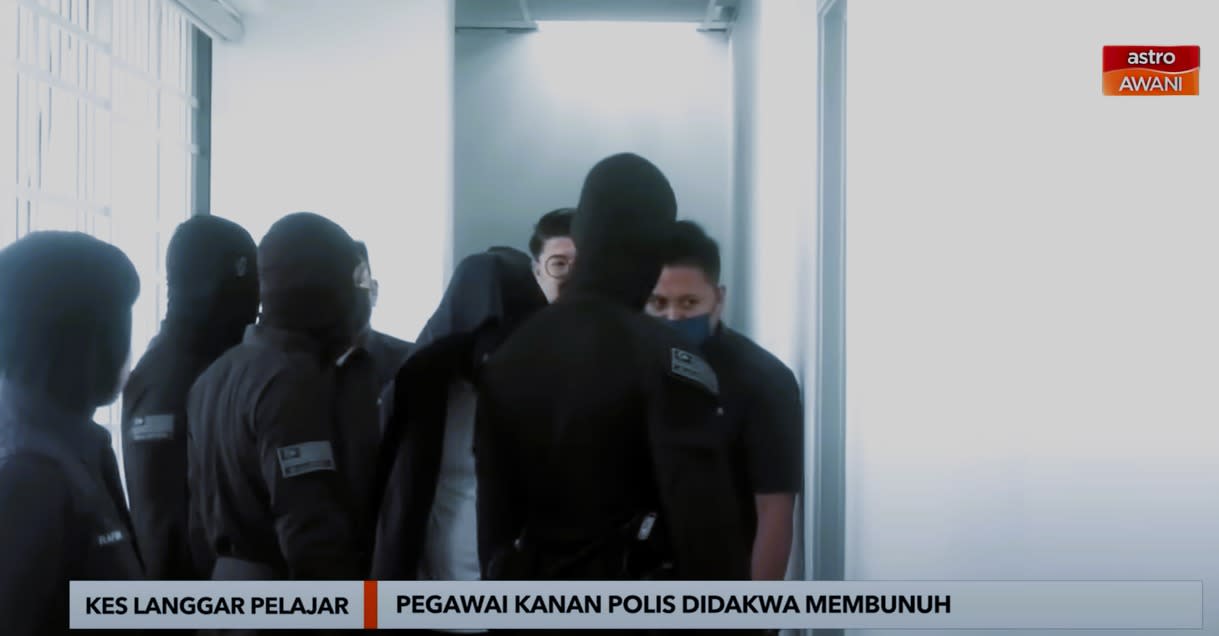‘Restrictions on media by police should stop’

Reports of restricted access imposed on the media covering a murder case involving a senior police officer have raised several controversial issues.
The accused, Nazri Abdul Razak, a deputy superintendent, was charged with the murder of a 17-year-old Muhammad Zaharif Affendi Muhd Zamrie at the Ipoh magistrates' court yesterday.
Only one representative per media organisation was allowed into the courtroom to cover the proceedings. The media, except Bernama and Astro Awani, were prevented from taking photographs and videos of the accused outside the courtroom as he arrived.
Many questioned why he was allowed to cover his face when he was not a juvenile, and there was no need to protect his identity.
When two former prime ministers and a deputy prime minister were charged in court for criminal offences, they did not cover their faces.
In this case, some media claim censorship while others claim selective and preferential treatment for the two media agencies allowed access outside the court. The controversy must be resolved amicably with urgency and priority.
This commentary will address the significance of the role of law enforcement departments and media in civil society democratic societies.
A strong and honest relationship between law enforcement departments and the media is crucial for maintaining transparency, accountability, and public trust in law enforcement.
However, building trust between law enforcement and the media can be challenging. It requires open communication, transparency, and a willingness to work together.
A culture of honesty and transparency within law enforcement can help foster constructive relationships with the media. This, in turn, can lead to greater transparency and accountability in law enforcement operations, which promotes public trust and better serves the needs of civil society.
Most importantly, a strong and honest relationship between law enforcement departments and the media is essential for maintaining public safety and upholding the principles of transparency and accountability in law enforcement.
It is a must that a strong and trusting relationship be established between law enforcement departments and the media. It is crucial for maintaining transparency and effective communication.
There must be proactive prudent measures to prevent any breakdown. The following are some significant factors that can help establish a strong relationship.
Regular and transparent communication between law enforcement departments and the media helps foster understanding and trust. Providing timely updates, sharing information on ongoing investigations, and being accessible to address media inquiries are all essential.
Law enforcement and media professionals should respect each other’s roles and responsibilities. Recognising the importance of their respective functions and treating each other with professionalism and courtesy can develop trust on an individual level.
Social interactions and events that bring them together can facilitate mutual understanding and improved cooperation.
Clear guidelines and protocols for media interactions with law enforcement can enhance trust.
Guidelines that specify what information can be publicly shared, how media should handle sensitive cases, and how investigations are communicated, can set expectations and avoid misunderstandings.
The need to share accurate and timely information helps the media report accurately, thus reducing the likelihood of misinformation. Providing regular press briefings, sharing official statements, and sharing relevant facts can ensure accurate reporting.
However, some factors can potentially destroy trust between law enforcement and the media. The factors below are non-exhaustive.
When law enforcement perceives the media reporting as inaccurate or misleading, it can lead to a breakdown in trust. Similarly, when media outlets sensationalise stories or fail to verify facts, it erodes law enforcement’s trust in their professionalism.
If law enforcement departments withhold information or appear secretive, it can lead to suspicion and distrust from the media. Information that is unnecessarily withheld or delayed without valid reasons can damage the relationship.
Persistent negative portrayals of law enforcement by the media can breed distrust. If the media focuses disproportionately on misconduct or negative incidents without considering the broader context, it may lead to a strained relationship.
When law enforcement restricts media access to information or events without proper justification, it can create a perception of opacity and hinder the media’s ability to report accurately. Censorship and excessive limitations on access can damage trust and hinder the media’s ability to fulfil its watchdog role.
Whenever there are instances where either party fails to maintain professionalism during interactions, they can undermine trust. This includes disrespectful behaviour, personal attacks, or bias exhibited by the media or law enforcement personnel.
The failure to hold individual law enforcement officers accountable for misconduct, excessive use of force, or other issues can lead to a loss of trust in the institution.
The media plays a significant role in highlighting such issues, and if they perceive a lack of action or accountability, trust can rapidly diminish.
Developing and maintaining a strong, trusting relationship requires ongoing effort and commitment from law enforcement and the media.
Open communication, mutual respect, and dedication to accurate and transparent reporting are key factors in fostering a healthy relationship.
In the era of Malaysia Madani, access and exposure to information and knowledge must be free flow without unwarranted barriers.
Editor’s note: Perak deputy police chief Datuk Azizi Mat Aris told members of the media yesterday that the senior police officer involved in the case concerning the death of a 17-year-old in Ipoh was “an ordinary offender” and that the police “don’t view him as a high-profile individual only that the case has attracted attention, so we need to have a tight cordon”.
The views expressed here are the personal opinion of the writer and do not necessarily represent that of Twentytwo13.
The post ‘Restrictions on media by police should stop’ appeared first on Twentytwo13.


